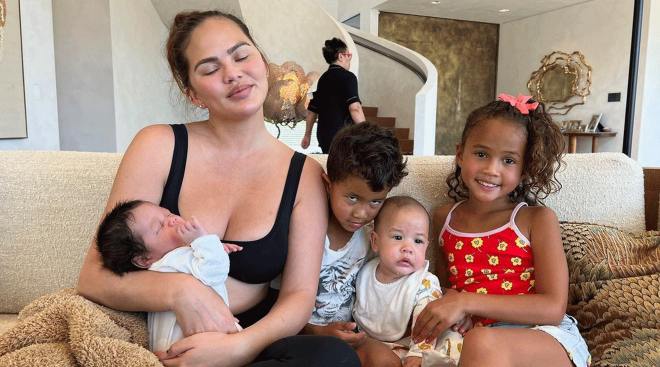20 Positive Parenting Affirmations to Boost Your Mental Health
Becoming a new parent is a life-changing experience, and, while incredibly fulfilling and rewarding, the journey also comes with its fair share of challenges. Plus, thanks to the pandemic, parents have suffered sizeable burnout in recent years. It can all start to feel rather daunting—but don’t discount the power of positive affirmations for parents. Affirmations are short mantras you can recite to yourself, and experts have long been touting their positive effects on mental health, confidence and overall outlook on life. Keep reading to learn more about how to incorporate parenting affirmations into your routine (and why you should).
As a parent, you’re likely constantly fretting over baby’s health, happiness and development. By using parenting affirmations, you can combat any negative thoughts and take back control of your emotions. “The very desire to begin using affirmations shows that you’re conscious of the agency you have to make intentional thoughts and choices that lay the foundation for your wellbeing,” says Christina Furnival, LPCC, a child and family counselor, author and mom of two. “The actual reciting of affirmations trains your brain to utilize specific thought patterns that are helpful and encouraging, supporting your resilience in parenthood.” Science backs this up: A 2016 study using MRIs found a positive correlation between affirmations and increased self-value.
The beauty of positive affirmations for moms and dads is that they’re short statements you can quickly remind yourself of at any point in the day. There’s no one way way to incorporate these affirmations into your routine—rather, “play around with the timing and figure out what feels right to you,” Furnival says. She breaks them down into two buckets: daily affirmations and affirmations used in challenging moments, and offers tips on how to use both to help boost your confidence and calm your frustrations.
Daily parenting affirmations
Including parenting affirmations into your routine is easier to do if you link it with an existing habit, Furnival says, such as your morning routine or mealtimes, when you have some time to talk to yourself and recite them. “Play around with the timing and figure out what feels right to you,” she adds. “It’s also helpful to set a reminder in your phone for everyday or every other day because, let’s face it, it’s easy to forget even with the best of intentions.”
When thinking about which daily affirmations to use, Furnival says shorter affirmations may be easier to remember, but ultimately they should be “globally true” for your life, such as, “I live a life rich with love.”
Parenting affirmations for challenging moments
Parenting affirmations that are used in challenging moments should be encouraging and specific to the situation, Furnival notes. It’s helpful to remind yourself in these moments that your child is doing their best as well. Ensuring that your parenting affirmations focus on both yourself and your kids can help set you up for success—as long as you’re being true to yourself, your life and your family. “If you’re telling yourself something that feels incredibly false, not only will it not work, but your own brain will fight against it and will look to disprove the positive affirmation,” Furnival explains.
In moments when parenting is especially difficult, rather than telling yourself a blanket statement around how much you love being a parent, or skating over the issue at hand, be honest. “[Affirmations shouldn’t be] ‘toxically’ positive, but rather honest, encouraging, and empowering,” Furnival says.
Now that you know why and how to use affirmations, you might be wondering which affirmations to use. Like many other aspects of parenting, these will vary based on your circumstances. Instead of trying to find the “best” mantras, focus on ones that resonate with you. “You do you,” Furnival says. “The best affirmations are the ones that you remember to use.” Below, some positive affirmations for moms and dads to use on the regular or in trying moments.
Parenting affirmations to use daily
- “I am the best mom/dad/caregiver for my child.”
- “I am a good enough parent.”
- “Today is a new day for our family.”
- “I live a life rich with love.”
- “I’m doing the best I can for my family, and it’s enough.”
- “Despite the challenges, my children feel loved and safe.”
- “Not only is it okay to ask for help, but I deserve help.”
- “I am grateful for my kids, my partner and my family.”
- “I believe in myself and accept that I am enough.”
- “I learn and become a better parent with each passing day.”
- “In taking care of myself, I’m teaching my kids the value of self-care.”
Parenting affirmations to use in challenging moments
- “My child is not giving me a hard time, they are having a hard time, and I can help.”
- “I will breathe and respond calmly in this moment.”
- “Parenting has ups and downs, and I can handle them.”
- “I don’t love these struggles but I love my kids.”
- “My child and I are learning as we go.”
- “I will choose to model what I want to see in my children.”
- “Even in the tough moments, my kids and my family still love me.”
- “It’s okay that I had a bad moment or day. This too shall pass.”
Not only will practicing daily parent affirmations help with your mental health, but it’ll also teach positive mental health practices to your kids. “Let your children see and hear you saying affirmations, and teach them some as well,” Furnival says. “Supporting our children to engage in practices that encourage positive mental health and wellbeing will do our families and communities a world of good.”
About the expert:
Christina Furnival, LPCC, is a child and family counselor, mom of two and author of the books The Not-So-Friendly Friend and kids’ series Capable Kiddos. She earned her bachelor’s degree in childhood development from Vanderbilt University and her master’s degree in professional counseling from Lipscomb University, both located in Tennessee.
Please note: The Bump and the materials and information it contains are not intended to, and do not constitute, medical or other health advice or diagnosis and should not be used as such. You should always consult with a qualified physician or health professional about your specific circumstances.
Plus, more from The Bump:
Navigate forward to interact with the calendar and select a date. Press the question mark key to get the keyboard shortcuts for changing dates.





















































